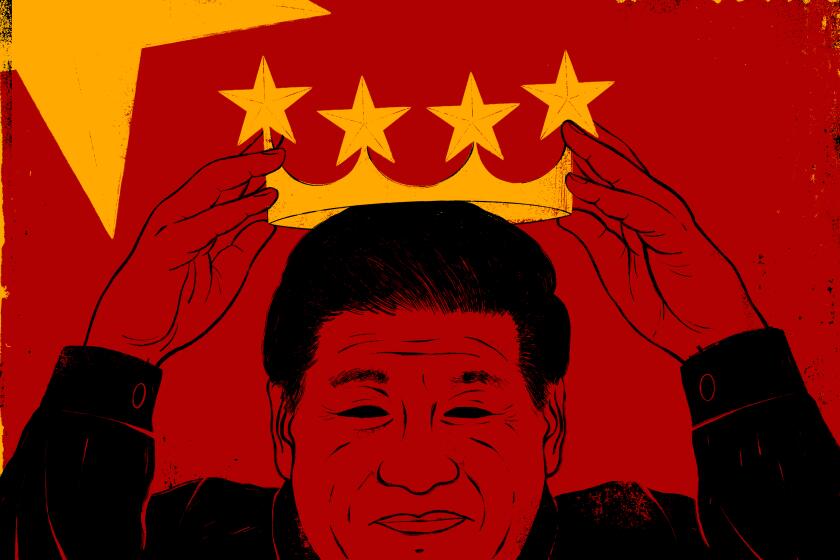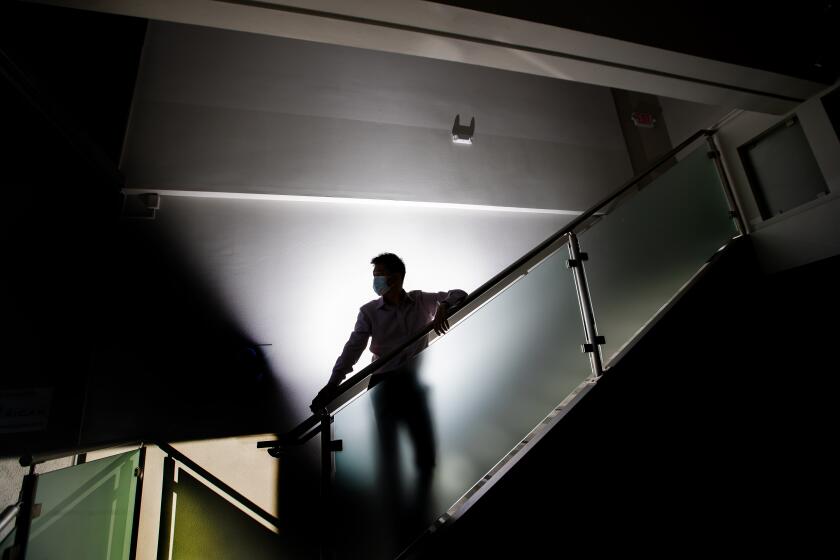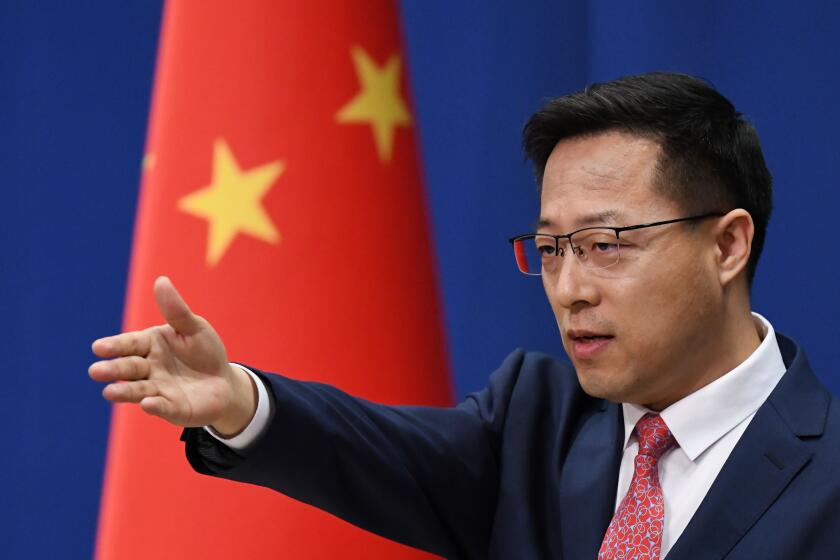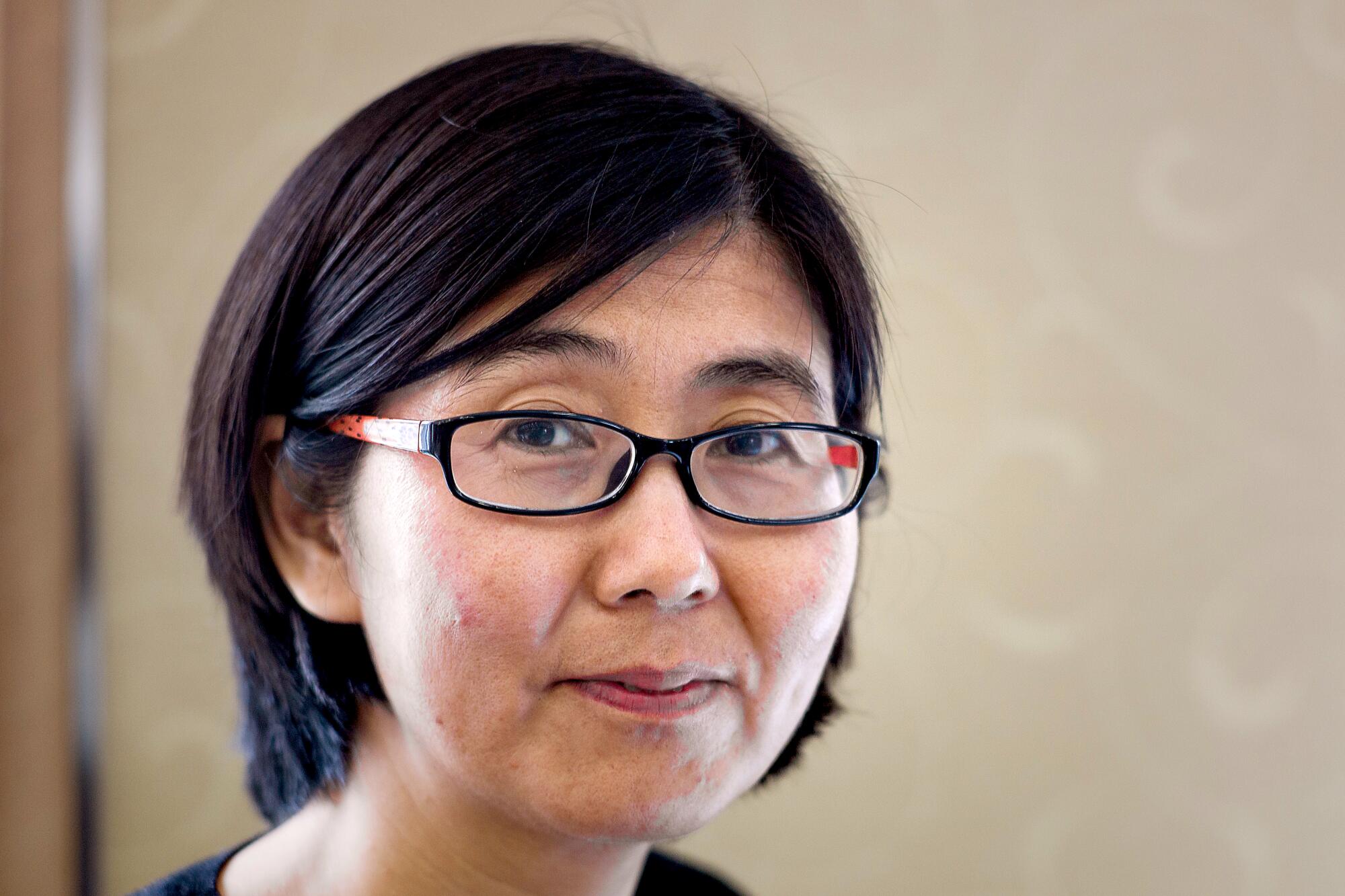
- Share via
BEIJING — Wang Yu was a fearless human rights lawyer, defying political threats to defend abused schoolchildren, jailed feminists and persecuted minorities. That defiance steeled her against her government and carried her through years of imprisonment.
Only one thing could make her compromise: her son.
Wang was the first of more than 200 swept up more than five years ago in a crackdown on human rights lawyers and activists in China. After more than a year in secret detention, where she was subject to shackled interrogations, isolation and sleep deprivation, she made a forced confession.
She went on state television and blamed foreign forces for indoctrinating her with “ideas like Western universal values, democracy and human rights, to attack and smear the government.... I am Chinese. I can only accept the Chinese government’s leadership.”
In return, her captors promised, Wang’s teenage son Bao Zhuoxuan would be allowed to travel abroad.
Last year, he sought asylum in the U.S. But — as if he were a case from one of his mother’s old files — Bao landed in a detention center in the desert northeast of Los Angeles. He spent a month there, among hundreds of other asylum seekers and immigrants, before receiving parole.
Mother and son have become characters in an unenviable, if ironic, twist of fate. Wang this month received an “International Women of Courage” award from the U.S. State Department. Chinese security officers blocked her from attending the online ceremony, putting her under 24-hour monitoring and prohibiting her internet use for several days.
Meanwhile, her son, now 21, is held in legal limbo by the same government that honored his mother. He remains in Los Angeles, his passport confiscated, awaiting immigration court to decide whether he should be allowed to stay in the United States or be deported back to China, where he could be imprisoned.
The story of Wang Yu and Bao Zhuoxuan is a testament to oppression in China but also a glimpse at what civil rights lawyers say is America’s failure to uphold human rights at home in its treatment of migrants and asylum seekers. That contradiction is especially critical today as the Biden administration seeks to counter China’s rising power through “values-based alliances” with democratic countries.
For Chinese officials and state media, Western human rights failings are a way to deflect criticism against their own repressive government. For families like Wang’s, who have risked everything to secure the safety and freedom of their children, they are a matter of life and death.
Wang practiced commercial law until 2008, when she was reportedly blocked from boarding a train in Tianjin and attacked by public security officers when she protested. She complained about the officers’ behavior but was charged with “intentional assault” and jailed for 2½ years. Bao was 9 years old.
The experience changed Wang’s view of her profession. She realized, she said, that the law in China was useless when it challenged those in power.
“The law is only made for showing the outside world that the Chinese legal system is great. If you try to use the law for real, it harms [the authorities’] interests,” Wang said. “But I want to be a person of the law.”
Wang soon joined a movement of human rights lawyers and took on sensitive cases, including that of Uyghur intellectual Ilham Tohti and members of the banned Falun Gong religious group. She became known in a way that was dangerous.
China’s paramount leader, Xi Jinping, sees himself as a savior, anointed to steer the Communist Party and China away from corruption and foreign influence, into a ‘new era’ of prosperity, power and political devotion. Whether his vision matches reality is another question.
Chinese President Xi Jinping, who came into power in 2012, saw civil society, lawyers, journalists and the very concept of human rights as a threat to the Communist Party’s rule. When he launched a crackdown on lawyers in July 2015, Wang was first to be arrested.
She was alone at home that night, waiting for her husband to send Bao, then 16, on a long-awaited flight to study abroad in Australia. The lights suddenly went out. More than 10 men broke down Wang’s door with an electric drill. They pushed her to the floor, handcuffed her and put a bag over her head.
At the airport, police surrounded and separated Bao from his father. Bao was locked in a hotel room for several days, then sent to his grandparents in their hometown in Inner Mongolia. His father, also a lawyer, was imprisoned.
The teenager decided to flee. He was smuggled through southern China’s Yunnan province and crossed the border into Myanmar in October 2015. He spent four days there before Chinese police snatched him back across the border.
Bao said police beat him with sticks and threatened his life. They interrogated him and accused him of being backed by “foreign forces.”
“Even if you are beaten to death and we throw you into the wild here, no one will care. Your corpse will be lost,” Bao, in an interview with The Times, remembered them shouting.
“I felt immense terror,” he said. “I stopped resisting very fast.” The police detained him for another week, often waking him up at 1 a.m. for interrogation and forcing him to sign criminal confessions.
Then they sent him back to Inner Mongolia. Police moved into the apartment across from him and installed facial recognition cameras at the front door. An alarm went off each time he stepped outside. Police drove Bao to and from school each day, installed cameras in his classroom and followed his every move.
“Every day you lift your head and you see cameras. At all times, all moments, they are watching and monitoring you,” Bao said.
“He was only 16, but he lived in terror,” said Wang. For months, she had refused to make a “confession” despite repeated abuse in prison. But when authorities showed Wang a picture of Bao at the police station in Yunnan, she wept and later gave her “confession.”
Every day you lift your head and you see cameras. At all times, all moments, they are watching and monitoring you.
— Bao Zhuoxuan
It took two years and two more tries after Wang’s release to get Bao out of China, including another confrontation at the airport where police cut up Bao’s passport. Only after Wang “went crazy,” she said, giving interviews to foreign media and trying to hold protests for her son, did authorities allow him to fly to Australia in 2018.
Before leaving, state security officers threatened Bao. “Keep a low profile,” they told him. He obeyed, refraining from public advocacy for two years.
“Even though I’ve been threatened, I’m not afraid of them,” Bao said. “But I’m afraid of what they will do to my parents.”
Bao grew up hearing about the people his parents tried to help: petitioners who’d been sent to mental hospitals because they asked for justice, people whose homes had been demolished against their will, poor folk who applied for social aid and were rejected, then beaten by police.
“Since I was young, I observed that China’s society is not equal. If you are an official, you have more power and rights than others,” Bao said. “My parents never gave me any kind of hatred toward the party or toward China…. But when I saw these things, I felt this society is not normal and needs to be changed.”
In March 2020, Bao left Australia on a tourist visa for the United States, hoping to further his studies and seek asylum. He was detained by Customs and Border Protection officials at Los Angeles International Airport and sent to Adelanto detention center, a former prison northeast of Los Angeles, now an immigrant detention center run by the GEO Group, a private prison company working with Immigration and Customs Enforcement, or ICE.
“It’s a prison for all purposes except for the name,” said Robyn Barnard, senior staff attorney at Human Rights First, a nonprofit that campaigns for human rights in the United States and is helping with Bao’s asylum case.
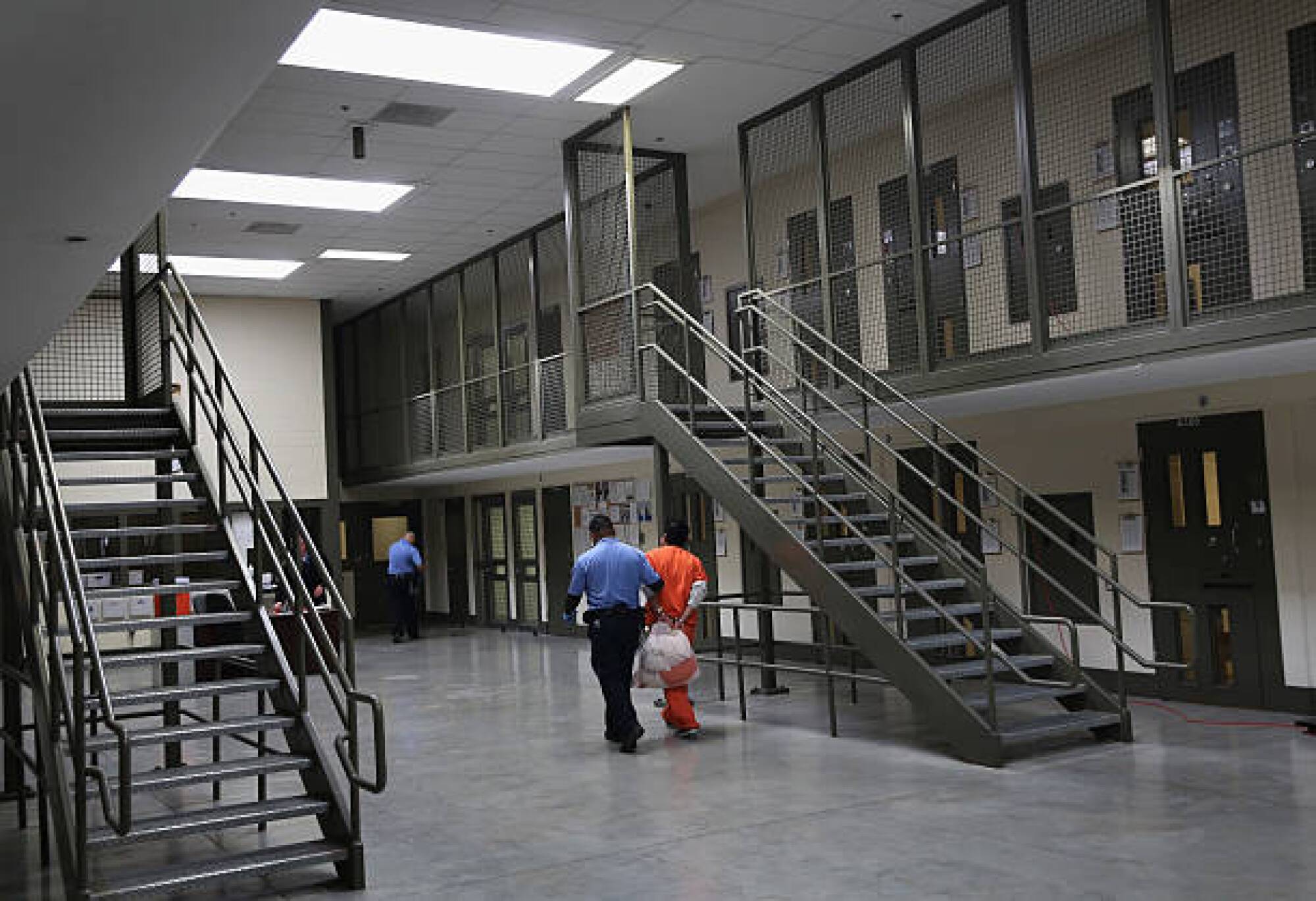
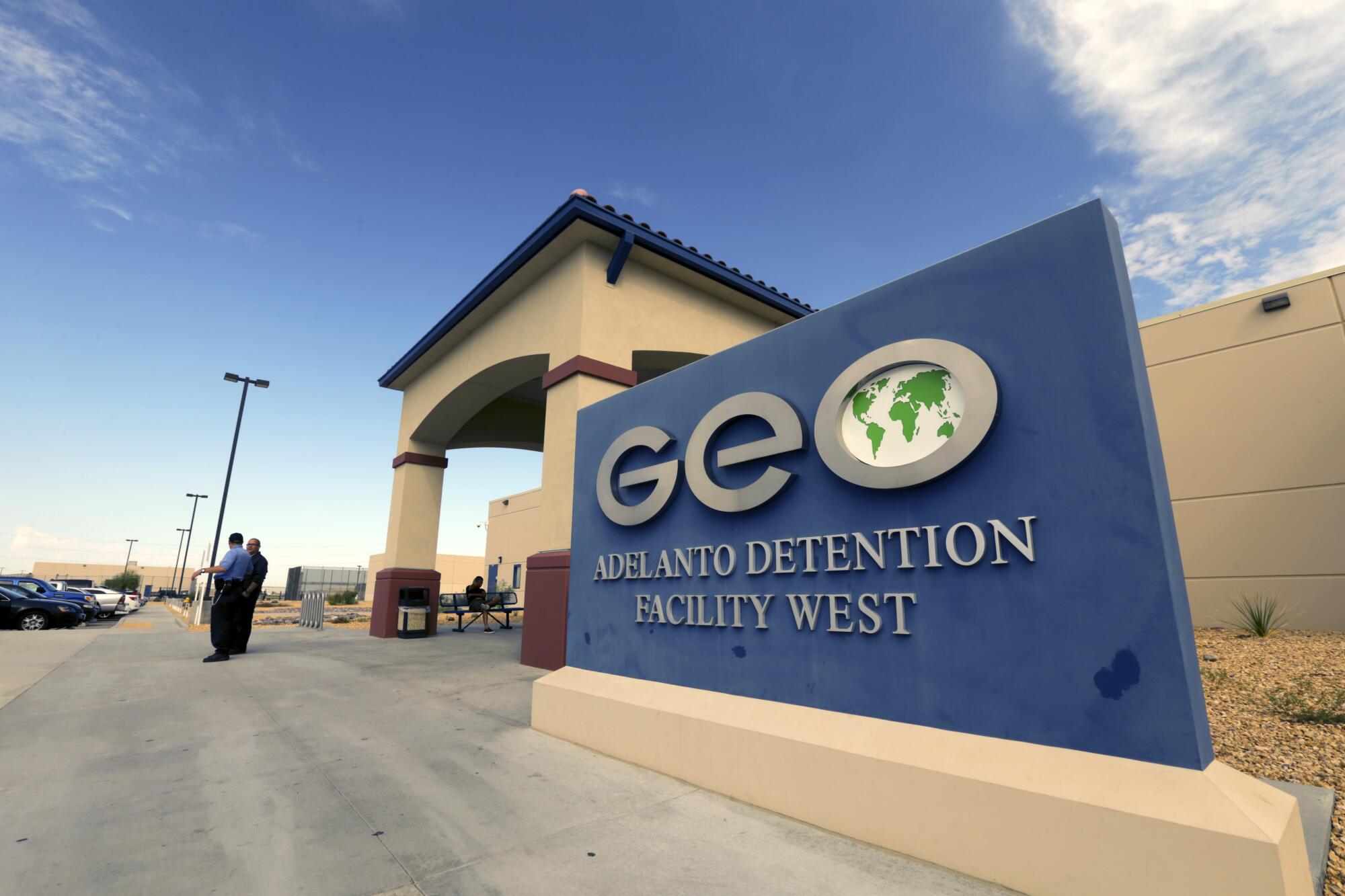
The detention triggered the nightmares, anxiety and other post-traumatic symptoms Bao has had ever since his confinement in China. “My mental state was really bad,” he said.
Bao spent about a month in Adelanto, which he said was “relatively better” than Chinese detention: The food was improved and there was no forced labor. Detainees were not handcuffed and sometimes were allowed outside for short periods. There were also many Chinese people to speak with, he said.
Bao feared he would endanger his parents if he called them. He notified their friends, who helped raise his case with Human Rights First and with U.S. government agencies that knew about the ordeals of mother and son.
Bao was paroled, Barnard said — the only asylum case she’d seen get parole from Adelanto out of all her clients in the last three years. ICE states that the average stay in detention is 55 days, but some immigrants have spent years in holding centers waiting for hearings.
A Times investigation found that since 2017, at least 265 calls have reported violence and abuse inside California’s four privately run immigrant detention centers. Half of them alleged sex crimes against detainees.
Detention of asylum seekers was common under the Trump administration, she said, part of a broader policy to deter people from seeking asylum in the United States. “It was designed to push people to give up and say, ‘I can’t do it.’ But these are people who are fleeing persecution,” Barnard said. “Where are they going to go?”
Those released on parole, like Bao, one of more than 600,000 asylum seekers awaiting a decision on his status, have their passports confiscated, which makes basic tasks such as opening a bank account or getting a driver’s license difficult. They cannot work unless they wait for at least 12 months and then receive special approval.
The pandemic has slowed hearings; Bao’s court appointment in January was pushed back until this summer and may be delayed further. But he emphasized that he was better off than he would be in China.
“It’s very difficult for me to live here,” Bao said. “But if you compare it to 24-hour surveillance of the past, I still think life [in the U.S.] is better. At least I am free now. I am happy about this.”
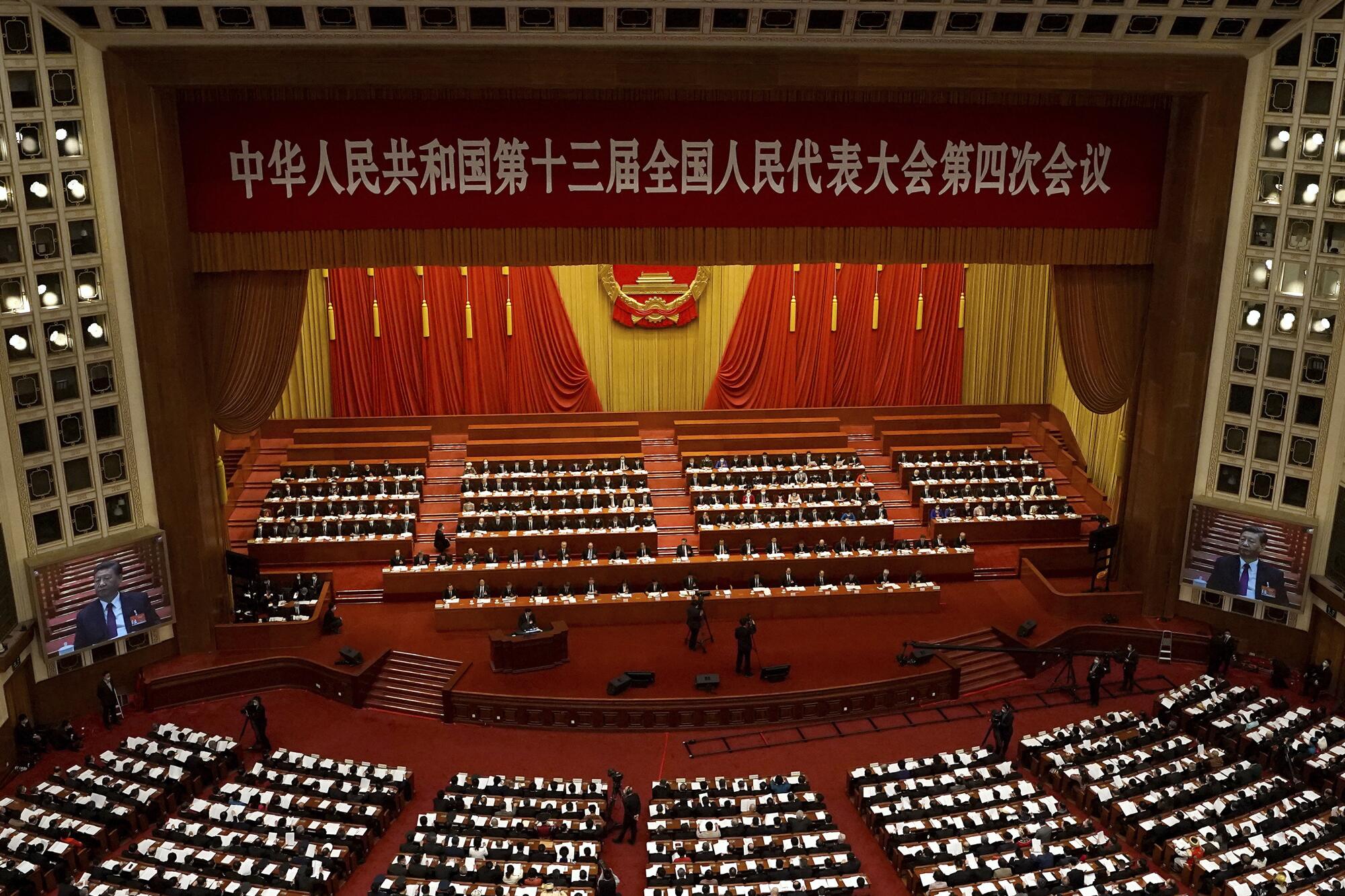
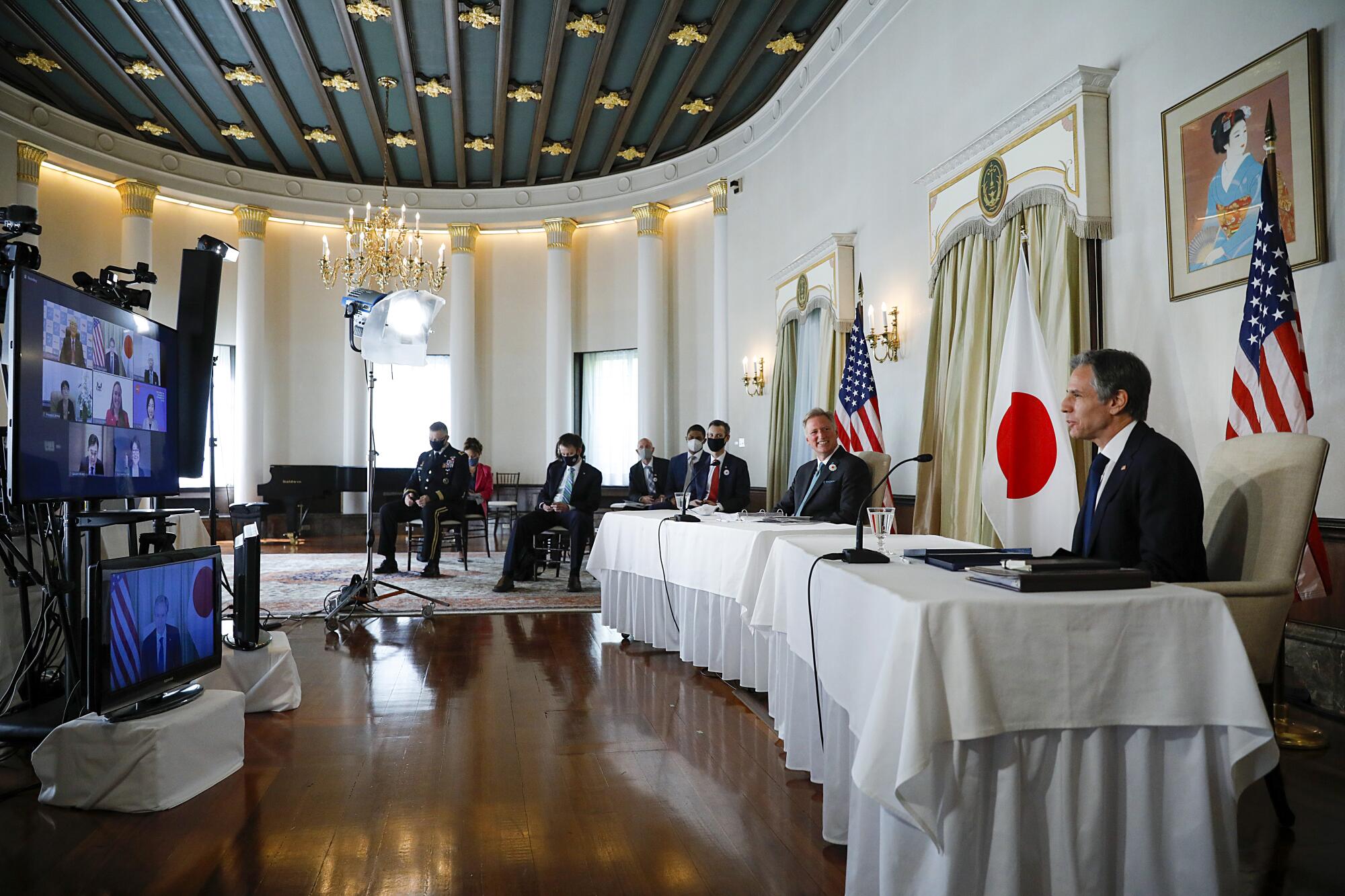
Human rights cases such as Bao’s are potent grist for Chinese propaganda. Last week, China expressed “deep concern” at the United Nations Human Rights Council about Australia’s detention of asylum seekers. Since 1998, China has published an annual report on human rights violations in the United States. Chinese officials have claimed repeatedly over the last year that China’s successful pandemic control methods make it the best guarantor of “real” human rights.
Such claims are China’s attempts at distractions from its own human rights violations, including mass incarceration of ethnic minorities in Xinjiang and destruction of Hong Kong’s democratic freedoms. But they have gained currency in recent years, especially as the United States dropped out of the U.N. Human Rights Council under the Trump administration.
‘Put on a mask and shut up’: China’s new ‘Wolf Warriors’ spread hoaxes and attack a world of critics
The aggressive nationalism of China’s diplomats matches the swagger of Xi Jinping’s China, which is determined to deflect blame for the coronavirus.
The Biden administration has promised to refocus America on human rights. Washington has spoken out on issues such as Xinjiang and Hong Kong and given awards to courageous individuals including Wang. But to reassert moral authority abroad, human rights advocates say, the U.S. should first demonstrate a moral example at home.
“If Mr. Bao had come to our southern border during the pandemic, he would have been stuck in Mexico or expelled to certain imprisonment in China,” Barnard said. “The U.S. calls out the Chinese government for their persecution of Uyghurs, Chinese activists, and the crackdown on democracy in Hong Kong. Will they welcome those who flee those violations or continue to lock them up in prisons?”
Wang spoke with The Times in Beijing shortly after receiving her courage award. She said she was troubled by the disbarring of Chinese lawyers who defended Hong Kong protesters and activists who had documented the Wuhan lockdown during the early days of the pandemic. Fewer lawyers are willing or able to take on human rights cases, even as defendants in those cases are given harsh sentences.
Wang is largely prevented from practicing law in China. Legal firms that try to hire her have been threatened by state security officers. But she is still providing legal advice as a “citizen advocate” on human rights cases, she said, though she is banned from leaving China and constantly monitored.
“In China, human rights lawyers are in a dangerous situation. Without international attention, they can be arrested at any minute,” she said. “Each of us is only an individual, but what we are facing is the whole state machinery.”
In China, human rights lawyers are in a dangerous situation. Without international attention, they can be arrested at any minute. Each of us is only an individual, but what we are facing is the whole state machinery.
— Wang Yu
Her voice softened when she spoke of her son. He was tall but skinny, “not physically strong.” He spoke quietly, like his mother, but was stubborn about making his own decisions. Sometimes he hid things from her, she said.
Once, shortly after Wang’s release, she had tried to talk about detention. “Son, listen to my words,” she began. “I have suffered many difficulties. I was placed in handcuffs and fetters.”
Bao looked at her. “Who hasn’t been in handcuffs and fetters?” he replied.
Wang believes her son will receive asylum. “The U.S. has a more complete and functional legal system,” she said. But she worried for Bao. She never felt like she had the full picture of how he was doing, whether he felt alone, whom he would go to if he was afraid.
When he was overseas and unwell, he would withdraw from his parents, only telling them, “I don’t feel like talking.”
Wang wished she could leave China to see Bao again, to watch over him like she did when he was little.
“Sometimes my heart hurts,” she said. “He is my only child.” But he was beyond her reach now.
More to Read
Sign up for Essential California
The most important California stories and recommendations in your inbox every morning.
You may occasionally receive promotional content from the Los Angeles Times.
